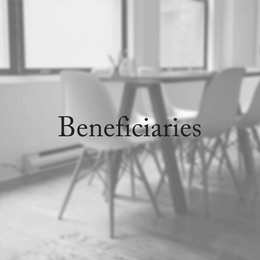
What is meant by the term beneficiaries? Being the beneficiary of an estate is bittersweet. When someone dies, their assets can’t go with them. The people to whom these assets are given under the law are called beneficiaries.
The hope is that a beneficiary will ‘benefit’ from the will. All of the assets and money left behind by the deceased forms what is referred to as an estate. The estate is usually divided up according to the wishes of the deceased. Beneficiaries are either named by the testator in their will, or the estate is divided up according to the state’s intestacy laws if there is no will.
The law assumes a moral obligation on every will-maker: that you will take care of your immediate family if you have the means to do so. Common beneficiaries include your spouse, your children, and your grandchildren. You might also include extended family or a charity.
Speaking After You’re Gone
Having a will is essential if you’d like to decide whom your estate is given to. It may be that your state’s intestacy laws determine something very similar to what you might have chosen to do anyway, but a will does it with a conciseness about specific items, amounts and people that intestacy laws do not. Your beneficiaries ‘benefit’ not only from what you leave them, but the way in which you do it.
Taking the time to do your estate planning and to really think about what your beneficiaries will receive will speak to them in volumes even after you can no longer utter a sound. You’re not only  communicating your wishes, you’re also communicating to your family that they matter. Writing a will does not need to take a lot of your time, but that time will be significant to your beneficiaries.
communicating your wishes, you’re also communicating to your family that they matter. Writing a will does not need to take a lot of your time, but that time will be significant to your beneficiaries.
It is never too early to start estate planning. Your loved ones are going to be even more surprised than you if you pass away before you think it’s your time. Steve Irwin would not have been thinking that his last day really was going to be his last day. Both Prince and Carrie Fisher were also unexpected deaths in this year just gone. Death can come slowly and gently or it can come quickly with little or no warning.
[Tweet “It is never too early to start estate planning.”]
Clarity Means Less Chance of Chaos
For families that lose a loved one who has not named beneficiaries because they have not written a will, there can be great heartbreak. Dying without a will can become very messy when fights among relatives begin – usually centred around money. Being clear about who should benefit from your estate is helpful for the relationships of your family.
Bryan Mitchell, an Accredited Specialist in wills and estates, says that fights between relatives are much more likely when a deceased had a blended family and no will. “In my experience, in many, many estate fights these families never get back to together, they implode and stay imploded, and the bitterness goes on for generations,” he says.
Leigh Nelson, who lost her partner of 5 and a half years when he was 26 years old, encourages others to get their wills written even though they it may not seem relevant to them at the moment. Her partner, Bill, died from a fall from a skateboard and he did not have a will. The intestacy laws dictated that the majority of Bill’s estate should first go to Bill’s parents – not Leigh.
Leigh said, “Fortunately for me I’m very close to my partner’s family.” Bill’s parents agreed for the estate to go to Leigh and not to them, allowing her to stay in the house she and Bill had bought together.
But she warns others there could have been a range of scenarios, including where a surviving partner and the deceased family did not get on, which would have threatened a very different outcome.
Intestacy Rules When You Don’t
Each state in Australia has their own rules of intestacy. Just like Bill, one-third of Australians die intestate, making the distribution of their estate subject to those rules. Although the rules are in place to protect deceased estates and the families that benefit, they do not take your wishes into account. Why take the risk and not have a valid will in place?
 Under Queensland law, a formula applies for how your assets are divided without a will. The Queensland laws of intestacy are outlined in Part 3 of the Succession Act 1981. The intestacy rules help determine the distribution of your estate to your next of kin. Your next of kin would firstly be your spouse or de-facto, children and grandchildren. Provision is made for other family members (according to the rules) if you do not have a spouse or children. By not naming your beneficiaries in a will the law decides them for you.
Under Queensland law, a formula applies for how your assets are divided without a will. The Queensland laws of intestacy are outlined in Part 3 of the Succession Act 1981. The intestacy rules help determine the distribution of your estate to your next of kin. Your next of kin would firstly be your spouse or de-facto, children and grandchildren. Provision is made for other family members (according to the rules) if you do not have a spouse or children. By not naming your beneficiaries in a will the law decides them for you.
[Tweet “By not naming your beneficiaries in a will the law decides them for you.”]
If you don’t have a will then there are lots of things you don’t get a say about including:
Your beneficiaries. Who will benefit from you estate? There may be relatives you don’t want your estate shared with or there may be some who are not included because of the state’s intestacy laws that you would like to benefit.
Who will be in charge of administering your estate?
Your estate may take a longer time to settle and cost more than if you had written a valid will before your death. This can be an added burden for your loved ones who you’ve named beneficiaries.
Although they cannot be named in your will and are not considered part of your estate, your superannuation and life insurance policy is often a large asset that will be left to someone when you die. Who are the beneficiaries of this money? Keeping these documents up to date ensures that the beneficiaries are ones that you choose.
At Estate Battles, our experienced lawyers can help you with all of your estate planning needs. Writing wills is one of their specialties, enabling you to love well your beneficiaries even after you’re gone. We offer a free, 10-minute phone consultation. Please contact us today!

